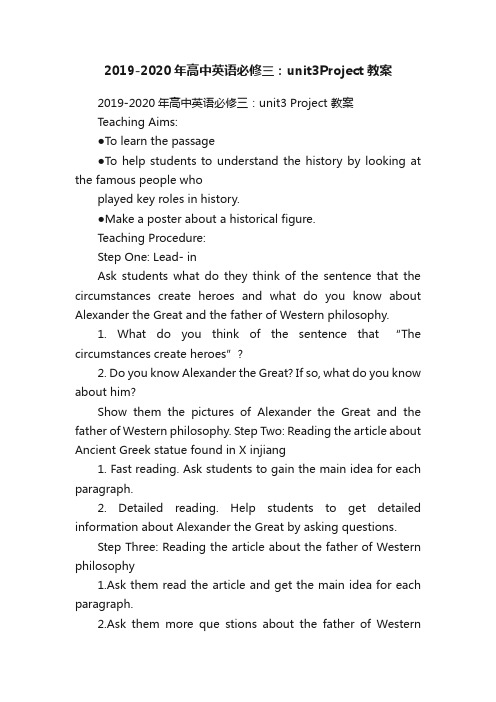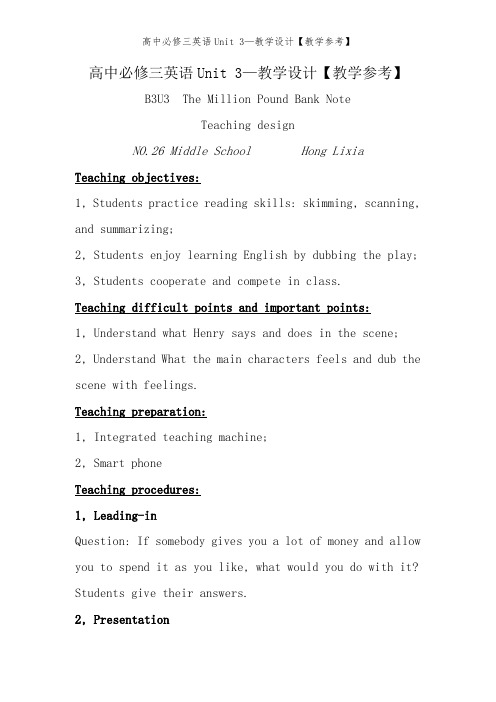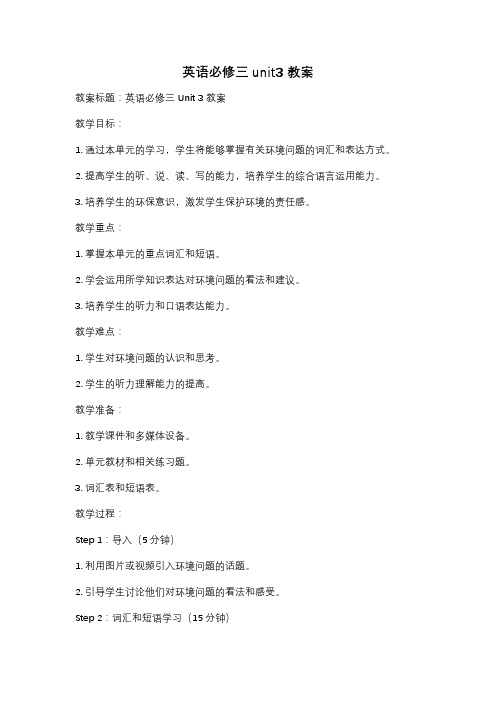2019-2020年高中英语必修三:unit3 Project 教案
2019-2020学年高中英语人教版必修三unit3第二课时教学设计

2019-2020学年高中英语人教版必修三Unit3 The Million Pound Bank NoteThe second periodReading and ComprehengdingTeaching Aims:1. Knowledge Aim:(1) Get the students to learn the useful new words and expressions in this part.(2) Learn the story by reading the passage Act 1, Scene 3 of The Million Pound Bank Note.(3) Get the students to experience the difference between American English and British English by listening to the record of the passage.(4) Learn the elements of play.2. Ability Aims:(1) Train the students’ reading skills by using different reading stratagies.(2) Enable the students to have a good understanding of the the passage Act 1, Scene 3 of The Million Pound Bank Note by doing different exercises.(3) Enable the students to learn how to analyse character of people.(4) Train the students’ ability to cooperate with others.Teaching Important Points:1. Let the students learn and understand the story.2. Learn the elements of play.3. Train the students’ reading skills.4. Train the students’ ability to cooperate with others.Teaching Difficult Points:1.Develop the students’ reading and abilty.2.Enable the students to learn how to analyse character of people. Teaching Methods:1.Task-based teaching and learning.2.Cooperative learning.3.Discussion.Teaching Procedures:StepⅠ GreetingsGreet the class as usual.Ste pⅡPre-readingLead the students to review the words and phrases in this part to prepare for reading.StepⅢReadingTask 1:Listen and read Scene 3 quickly and take down some notes according to the four elements: time, place, character, event(事件).Task 2: Read Scene 3 in characters and then try to answer the following questions in groups of four:1. Where does Henry Adams come from? Does he know much about London?2. What did he do in America?3. Why did he land in Britain?4. Why do you think that the brothers chose Henry for their bet?StepⅣComprehendingTask 1: Read the statements below and work in pairs to decide whether they are facts or opinions. Write “F”if it is a fact. Write “O”if it is an opinion.1.____ Henry wants to find a job in London.2. ____ Henry is given an envelope by the two brothers.3. ____ Henry is an unlucky young man.4. ____ The servant is called James.5. ____ Henry is foolish to go and meet the two brothers.Task 2: Analyse the character of the main role —Henry according to the following sentences and find some adjectives (or other words) to describe him.1. I earned my passage by working as an unpaid hand. (Independent)2. It is my first trip here.Well, I can’t say that I have any plans.Well, to be honest, I have none. (no money) (Honest)3. Could you offer me some kind of work here?I don’t want your charity. I just want an honest job. (Hard-working)4. Well, it may seem lucky to you but not to me.If this is your idea of some kind of joke, I don’t think it’s very funny.Now if you’ll excuse me, I think I’ll be on my way. (Frank)StepⅤSummaryRetell the story by filling in the following blanks.In the summer of 1903, two old and wealthy brothers, Roderick and Oliver, (1) _____ _____. They wanted to see whether a man with a million pound bank note could (2) _______ __ ______ in London. Oliver believed so, while Roderick (3) _______ __. They happened to see Henry, wandering on the pavement outside their house. So they asked Henry to come in. From what Henry said, the two brothers learned that Henry had been (4) _______ ____ ___ ____ by a strong wind and then spotted by a ship, on which he worked as (5) __ ______ _____ to earn his passage. He was (6) _____ ____________ they were looking for. So Roderick and Oliver gave Henry a letter with money in it and told him not to open it (7) ____ _________. At first, Henry refused but finally he accepted it and (8) _____ ___ ________.StepⅥHomeworkIn groups of four, play the parts of “Henry, Roderick, Oliver, and Servant”and act it out in the next class. While acting, pay attention to the correct pronunciation and intonation.课后反思:。
Unit3Project教案-黑龙江省海伦市第一中学2020-2021学年高中英语外研版必修三

Develop skills of searching information.
Plan
1. T asks Ss to decide what invention they will design to solve the problem and discuss its working principles.
教学难点
引导学生明确小组分工合作,相互协作完成小发明创造的方案。
教学策略
任务型教学法
Teaching contents
Procedures
Purposes
Teacher’s activity
Students’activity
Investigate
1. T asks Sstothink of some practical problemsthatthey face in daily life and make a list.
2. T asks Ss to label the key features and list the materials needed to make it.
3. T guides Ss to write a general introduction explainingthe working principles of the invention.
2. T guides Ss to make notes about the key features of their invention.
3. T asks Ss to discuss and decidewhatskills and materials theywill need to create it.
2019-2020年高中英语必修三:unit3Project教案

2019-2020年高中英语必修三:unit3Project教案2019-2020年高中英语必修三:unit3 Project 教案Teaching Aims:●To learn the passage●To help students to understand the history by looking at the famous people whoplayed key roles in history.●Make a poster about a historical figure.Teaching Procedure:Step One: Lead- inAsk students what do they think of the sentence that the circumstances create heroes and what do you know about Alexander the Great and the father of Western philosophy.1. What do you think of the sentence that “The circumstances create heroes”?2. Do you know Alexander the Great? If so, what do you know about him?Show them the pictures of Alexander the Great and the father of Western philosophy. Step Two: Reading the article about Ancient Greek statue found in X injiang1. Fast reading. Ask students to gain the main idea for each paragraph.2. Detailed reading. Help students to get detailed information about Alexander the Great by asking questions.Step Three: Reading the article about the father of Western philosophy1.Ask them read the article and get the main idea for each paragraph.2.Ask them more que stions about the father of Westernphilosophy.Step Four: Language PointsShow some useful expressions and explain the usage of these words and phrases. 1. When asked how… no doubt this was a result of Alexander the Great’s influence. no doubt 无疑,确实e.g. He’s made some great movies. There’s no doubt about it.他拍了一些非常出色的影片。
高中英语人教版必修3Unit3全单元教案设计

高中英语人教版必修3Unit3全单元教案设计Unit 3The Million Pound Bank Note单元规划类别课程标准要求掌握的项目话题Forms of literature and art: short story and drama; how to act out a play词汇birthplacen.出生地; 故乡Embassy n. 大使馆; 大使及其官员phrasen.短语; 词组; 惯用语Seek vt. & vi. 寻找; 探索; 寻求adventure n. 奇遇; 冒险patience n. 耐性; 忍耐novel n.小说; 长篇故事adj. 新奇的; 异常的contrary n. 反面; 对立面adj. 相反的;相违的authorn.著者; 作家Envelope n. 信封scenen.(戏剧)一场; 现场; 场面;景色Permit vt. & vi. 许可; 允许; 准许n. 通行证; 许可证; 执照wander vi. 漫游; 漫步; 漂泊steak n. 肉块; 鱼排; 牛排pavement n. 人行道pineapple n. 菠萝businessman n. 商人dessert n. 餐后甜点unbelievable adj. 难以置信的amount n. 数量aheadad v. 在前; 向前; 提前rude adj. 粗鲁的; 无礼的bayn.海湾mannern.礼貌; 举止; 方式stare vi. 凝视; 盯着看scream vi. 尖声叫n. 尖叫声; 喊叫声fault n. 过错; 缺点; 故障genuine adj. 真的; 真诚的bow vi. & n. 鞠躬; 弯腰rag n. 破布; 碎布passage n. 船费; 通道; (一)段indeed adv. 真正地; 确实; 实在account vt. & vi. 认为; 说明; 总计有n. 说明; 理由; 计算;账目spot vt. 发现; 认出n. 斑点; 污点;地点短语bring up抚养; 培养; 教育; 提出in rags衣衫褴褛go ahead 前进; (用于祈使句)可以; 往下说as for关于; 至于by accident偶然; 无意中; 不小心do with对待; 处理; 处置stare at盯着看; 凝视make a bet打赌account for导致; 做出解释be lost迷路; 倾心于某事on the contrary与此相反; 正相反permit sb. to do sth. 准许某人做某事take a chance冒风险; 碰运气in a. . . manner以……的举止(态度)重要句型1. Young man, would you step inside a moment, please? (request)2. I wonder, Mr. Adams, if you’d mind us asking a few questions. (I wonder if. . . )3. . . . I found myself carried out to sea by a strong wind. (find+O. +O. C. )4. And it was the ship that brought you to England. (it is/was. . . that. . . )5. The fact is that I earned my passage by working as an unpaid hand. . . (noun clause as thepredicative)6. You mustn’t think we don’t care about you. (double negative)7. That’s why we’ve given you the letter. (noun clause asthe predicative)8. Well, why don’t you explain what this is all about?(suggestion; noun clause as the object)功能 1. RequestWould you please come in?Could you offer me some kind of work?Would you mind waiting just a few minutes?I wonder, Mr. Adams, if you mind us asking a few questions? May I ask you how much money you have?—Well, to be honest, I have none.—Go right ahead.2. Ordering foodI’d like some ham and eggs and a nice big steak.I’ll have a nice long glass of beer.3. Shopping语法 1. Noun clauses as the objectI can’t say that I have any plans.. . . and he does not know what he should do.。
高中必修三英语Unit 3—教学设计【教学参考】

高中必修三英语Unit 3—教学设计【教学参考】B3U3 The Million Pound Bank NoteTeaching designNO.26 Middle School Hong LixiaTeaching objectives:1, Students practice reading skills: skimming, scanning, and summarizing;2, Students enjoy learning English by dubbing the play; 3, Students cooperate and compete in class.Teaching difficult points and important points:1, Understand what Henry says and does in the scene;2, Understand What the main characters feels and dub the scene with feelings.Teaching preparation:1, Integrated teaching machine;2, Smart phoneTeaching procedures:1, Leading-inQuestion: If somebody gives you a lot of money and allow you to spend it as you like, what would you do with it? Students give their answers.2, Presentation(1)Introduce the 4 characters in the text.(2)Get students known the 3 tasks in the class3,PracticeTask 1: general readingStudents read the text generally and retell the story by filling the blanks.Task 2: careful readingStudents read the text carefully and understand what Henry says and does by finishing a match task4, ProductionTask 3: dub it(1)Students work in groups to practice dubbing the scenewith smart phones;(2)Students compete dubbing the scene.5, Homework(1)Do the exercises following the text;(2)Dub the whole scene.。
英语必修三unit3 教案

英语必修三unit3 教案教案标题:英语必修三 Unit 3 教案教学目标:1. 通过本单元的学习,学生将能够掌握有关环境问题的词汇和表达方式。
2. 提高学生的听、说、读、写的能力,培养学生的综合语言运用能力。
3. 培养学生的环保意识,激发学生保护环境的责任感。
教学重点:1. 掌握本单元的重点词汇和短语。
2. 学会运用所学知识表达对环境问题的看法和建议。
3. 培养学生的听力和口语表达能力。
教学难点:1. 学生对环境问题的认识和思考。
2. 学生的听力理解能力的提高。
教学准备:1. 教学课件和多媒体设备。
2. 单元教材和相关练习题。
3. 词汇表和短语表。
教学过程:Step 1:导入(5分钟)1. 利用图片或视频引入环境问题的话题。
2. 引导学生讨论他们对环境问题的看法和感受。
Step 2:词汇和短语学习(15分钟)1. 教师通过展示词汇和短语的图片或示意图,呈现新词汇和短语。
2. 学生跟读并重复词汇和短语,教师进行发音指导。
3. 教师带领学生进行词汇和短语的记忆和巩固练习,如词汇卡片配对、填空等。
Step 3:听力训练(20分钟)1. 教师播放与环境问题相关的听力材料,要求学生听取关键信息。
2. 学生进行听力理解练习,如选择题、填空等。
3. 教师进行听力答案讲解和反馈。
Step 4:口语表达(15分钟)1. 学生分组进行小组讨论,讨论有关环境问题的话题,如"Should plastic bagsbe banned?"。
2. 学生展示自己的观点和想法,并进行互动交流。
3. 教师对学生的口语表达进行评价和指导。
Step 5:阅读理解(15分钟)1. 学生阅读与环境问题相关的文章或短文。
2. 学生回答与文章内容相关的问题,进行阅读理解练习。
3. 教师进行答案讲解和解释。
Step 6:写作训练(15分钟)1. 学生根据所学知识和讨论内容,撰写一篇关于环境问题的短文。
2. 学生相互交换作文,并进行修改和改进。
2019-2020学年高中英语人教版必修三unit3 reading 教案
2) — Do you think that housing price will keep ______ in the years to come?
— Sorry, I have no idea.
本单元(节、章)课标要求及教学目标分解
Teaching goals:
1.Knowledgegoal:Teach students the new vocabulary and their usages.
2. Ability goal:Learn how to act out a play
3. Emotional goal:To enable students to learn to be an honest man from the text.
【辨析】permitv. & allowv.在许多情况下二者可以通用,但:permit更正式、积极,有“主动许可、正式批准”之意。词义较强. allow偏重听任或默许,有并不反对或不加阻止的含义,词义较弱。
如:The nurse allowed him to remain there, though it was not permitted.护士让他留在那里,虽然这是(规定)不允许的。
on account of ______________
on no account __________________(放在句首时引起______句)
【即学即用】
1)She retired earlypoor health.
2)The companyenvironmental issues wherever possible.
必修三英语unit3教案
必修三英语unit3教案教案标题:必修三英语 Unit 3 教案教案目标:1. 通过本单元的学习,学生将能够熟练运用本单元所学的词汇、短语和语法结构。
2. 培养学生的听、说、读、写的综合能力,提高他们的英语交际能力。
3. 培养学生的批判性思维和解决问题的能力。
教学重点:1. 学习并掌握本单元的重点词汇、短语和语法结构。
2. 培养学生的听、说、读、写的能力。
3. 培养学生的批判性思维和解决问题的能力。
教学难点:1. 学生能够准确运用本单元所学的语法结构和词汇。
2. 培养学生的批判性思维和解决问题的能力。
教学准备:1. 教师准备:课本、多媒体设备、教学PPT、练习题等。
2. 学生准备:课本、笔记本、笔等。
教学过程:Step 1: 导入新课(5分钟)1. 引入新课,通过展示一些相关图片或视频来激发学生对话题的兴趣。
2. 引导学生讨论并提出问题,引出本课的主题。
Step 2: 新课讲解(15分钟)1. 教师通过PPT或黑板等方式,讲解本单元的重点词汇、短语和语法结构。
2. 结合例句和实际情境,帮助学生理解和记忆新知识。
Step 3: 听说训练(20分钟)1. 播放相关录音或视频材料,让学生进行听力训练。
2. 设计一些与课文内容相关的口语练习,让学生进行对话练习。
Step 4: 阅读训练(20分钟)1. 学生独立阅读课文,理解文章的大意和细节。
2. 学生进行小组讨论,分享自己的理解和观点。
3. 教师组织全班讨论,引导学生深入思考课文中的问题和主题。
Step 5: 写作训练(15分钟)1. 学生根据课文内容,完成相关写作任务,如写一篇短文、写一封信等。
2. 学生互相交流和修改自己的作文,提高写作质量。
Step 6: 巩固练习(15分钟)1. 教师设计一些练习题,让学生巩固所学的语法和词汇。
2. 学生独立完成练习,并相互检查答案。
Step 7: 课堂总结(5分钟)1. 教师对本节课的内容进行总结,并强调重点和难点。
2019-2020学年高中英语人教版必修三 unit3reading教案设计
2019-2020学年高中英语人教版必修三Unit 3 The Million Pound Bank Note年级:高一科组:英语科命题人:一、Analysis of the teaching material and the learnersThe topic of this unit is a short story by the American author Mark Twain. It is the two rich brothers Roderick and Oliver have made a bet, about a man who could survive a month in London with million pound bank note.The students are second-grade students of senior high school.some of them are low foundation of reading English.二、Teaching aims(1)Knowledge aims:Enable the students to understand the details about the whole scene and sum up the main idea of Act 1,Scene3.Get the students to read the play.(2)Ability aims:Develop students ’s reading skills and enable them to learn how to use different reading strategies to read different reading materials.(3)Emotional aims:Stimulate students’ interest of learning English by reading and acting this play.Develop students’ sense of group cooperation and teamwork.三、Important points and difficult pointsEnable students to understand the details about the whole scene and act out the play.Enable students to learn to use reading strategies such as skimming, scanning, and so on.四、Teaching procedures【Review】Ⅰ.Match the word with its meaning.birthplace A.小说Novel B.信封Adventure C.出生地Author D.奇遇;冒险Scene E.探索;寻求wander F.著者;作家Permit G.耐性;忍耐Fault H.漫游;漫步;漂泊Spot I.过错;缺点;故障Seek J.发现;认出;斑点Patience K.许可;允许;通行证;执照Envelope L.(戏剧)一场;现场;场面;景色Ⅱ.write down the meaning of the phrases in each sentence.1.The Smiths are praised for the way they bring up their children. (抚养)2.Go ahead for two blocks,then turn left. (前进)3.I found the key by accident when I was cleaning the room. (偶然)4.In the West people think it’s rude to stare at a person. (盯着看)5.Good luck accounts for her being famous overnight. (解释)6.It doesn’t seen ugly to me;on the contrary, I think it’s rather beautiful. ( 相反)Step1 Leading inQ1: Do you like movies?Q2 :Which movies is the picture standing for?(图略)Step2 While—ReadingTask1:【Scanning】Read the narrator together and try to find the 4“W”.(P1)(1)When:(2)Where:(3)What:(4)Who:Task2:【skimming 】1.listen to the tape,underline the words you have heard and tell me what are they.(主要人物关系思维导图)(line28-34)2.Summarize the backgroundHenry was an ___①___.One day he had an accident in a ②_ _.Luckily he was survive by a ship for ③.He arrived in London by earning his passage without pay,He was ④in the street .To his surprise,an incredible thing happened.Two ⑤brothers gave him a million pound bank-note because they had made a ⑥.Task3:1.Role play(line41-56)2.Others think and discuss the following questions(1)What do you think of Henry and the two brothers?㈠For Henry:“well, it may seen luck to you but not to me”“If this is your idea of some kind of joke,I don’t think it’s very funny”“Now,if you’ll excuse me, I think I’ll be on my way”( direct/frank )“I do not want your charity.I just want an honest job”(hard-working ) ㈡The two brothersRich:Naughty :Good judges of a man:Step3 Conclusion:Put the following event in correct order:A、Henry wandered in London streets.B、About a month ago Henry Adams was sailing out of the bay.C、The next morning he was spotted by a ship.D、Towards nightfall he found himself carried out to sea by a strong wind.E、On the ship he earned his passage by working as an unpaid hand.。
2019-2020年高中英语必修三:unit3 Language points 教案
2019-2020年高中英语必修三:unit3 Language points 教案Teaching aims:Students will learn to use some important phrases and key words.Teaching procedures:I.Important phrases1. A British club arranged for high school students to go on a cultural tour of places where there are lost civilizations.civilization [u] 文明,文明世界,文明社会;现代生活的舒适环境或文明设施[c/u] (特定时期和地区)社会文明e.g. Astronauts circling the earth are able to keep in touch with civilization by radio.环绕地球飞行的宇航员可通过无线电与文明世界保持联系。
Environmental damage threatens the whole of civilization.环境的破坏威胁着整个文明世界。
American civilization differs from ours.美国的社会和生活方式与我们不同。
We are proud of the civilizations of ancient China.我们为古代中国的文化而感到自豪。
What happened in that country horrified civilization.那个国家发生的事情令文明国家震惊。
▲ civilize vt.使文明,使开化;教化,熏陶,使文雅civilized adj.文明的,开化的;有教养的,文雅的e.g. Please be civilized. 请文雅点。
- 1、下载文档前请自行甄别文档内容的完整性,平台不提供额外的编辑、内容补充、找答案等附加服务。
- 2、"仅部分预览"的文档,不可在线预览部分如存在完整性等问题,可反馈申请退款(可完整预览的文档不适用该条件!)。
- 3、如文档侵犯您的权益,请联系客服反馈,我们会尽快为您处理(人工客服工作时间:9:00-18:30)。
2019-2020年高中英语必修三:unit3 Project 教案
Teaching Aims:
●To learn the passage
●To help students to understand the history by looking at the famous people who
played key roles in history.
●Make a poster about a historical figure.
Teaching Procedure:
Step One: Lead- in
Ask students what do they think of the sentence that the circumstances create heroes and what do you know about Alexander the Great and the father of Western philosophy.
1. What do you think of the sentence that “The circumstances create heroes”?
2. Do you know Alexander the Great? If so, what do you know about him?
Show them the pictures of Alexander the Great and the father of Western philosophy. Step Two: Reading the article about Ancient Greek statue found in X injiang
1. Fast reading. Ask students to gain the main idea for each paragraph.
2. Detailed reading. Help students to get detailed information about Alexander the Great by asking questions.
Step Three: Reading the article about the father of Western philosophy
1.Ask them read the article and get the main idea for each paragraph.
2.Ask them more que stions about the father of Western philosophy.
Step Four: Language Points
Show some useful expressions and explain the usage of these words and phrases. 1. When asked how… no doubt this was a result of Alexander the Great’s influence. no doubt 无疑,确实
e.g. He’s made some great movies. There’s no doubt about it.
他拍了一些非常出色的影片。
这一点是毫无疑问的。
2. In 334 BC, he… defeating every army that stood in his path.
stand in one’s path 阻碍(某人)
e.g. No one can stand in my path.
没有人可以阻碍我。
3. Yet, in 323 BC, he came down with a fever and died.
come do wn with 患(病)
e.g. The girl ha s come down with a influenza.
这个女孩得了流行性感冒。
4. In many cases, his questions made his students aware of their own errors.
aware of 意识到,察觉到
e.g. She slipped away without him being aware of it.
她悄悄离开,没有让他发觉。
5. Fin ally, some people had enough of him, so they took him to court for questioning…. have enough of … 受够了……
e.g. I have had enough of your cute remarks.
你那些高论我已经听腻了。
Step Five: Project
Ask students to discuss the 8 questions on Page 59 and make a poster about a historical figure.。
